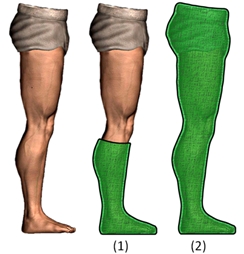The Right Trousers project aims to develop new soft robotic technologies that will help older people and people with disabilities to live more independently and with greater quality of life. Unlike conventional robotics, Soft robotics are new compliant active materials and structures that work in harmony with the human body. Instead of using motors, metals and plastics soft robotics employs smart materials that bend, twist or contract when electrically stimulated. These ‘artificial muscles’ can replace motors and can be used to restore mobility and physical functionality. The Right Trousers project encompasses a range of assist and rehabilitation applications including wearable soft devices to help people who have suffered a stroke, trousers for people that mobility problems and active orthotics.

The first project was a £2 million project called Wearable soft robotics for independent living which was led by the University of Bristol in collaboration with the universities of Nottingham, Leeds, Strathclyde, Southampton, Loughborough and UWE Bristol. The project was part of a £5.3 million funding programme announced by the EPSRC today to transform the design of assistive and rehabilitative devices. At the beginning of 2019, the Right Trousers project received a £1.5 million grant from the Engineering and Physical Sciences Research Council to continue with a three-year follow-on project. The FREEHAB project will build on the discoveries from The Right Trousers project, starting to translate some of the developed technology from laboratory towards a clinical setting, where it can help patients with their physical rehabilitation. The FREEHAB project is a join collaboration between The University of Bristol and The University of the West of England with joint expertise in wearable soft-robotics, movement analysis and neurological rehabilitation.
The Need
With an ageing UK population, older people could have the opportunity to stay independent for longer thanks to the FREEHAB study. Further research, led by the University of Bristol in collaboration with UWE Bristol, will continue the work of the Right Trousers project in order to develop smart trousers using artificial ‘muscles’ in its soft fabric to help older people and people who have had strokes. The research will pinpoint how the technology could facilitate the rehabilitation assessment of patients, and these findings will help shape the design of the trousers.
The research project, funded by a £1.5 million grant from the Engineering and Physical Sciences Research Council (EPSRC), will work towards enabling people with mobility impairments, disabilities and age-related weaknesses to live independently and with dignity. The soft robotic clothing could help vulnerable people avoid falls by supporting them whilst walking, give people added bionic strength to move between sitting and standing positions and walk for longer.

This is the first time soft robotics technologies have been used to address the many rehabilitation and health care needs in one single type of wearable device. Many existing devices used by people with mobility problems can cause or aggravate conditions such as poor circulation, skin pressure damage or susceptibility to falls, each of which is a drain on health resources. Wearable soft robotics has the potential to improve many of these problems and reduce healthcare costs at the same time too.
This intelligent clothing or ‘second skin’ will use artificial ‘muscles’ made from smart materials and reactive polymers which are capable of exerting great forces. The wearable device will be developed using the latest wearable soft robotic, nanoscience, 3D fabrication, functional electrical stimulation and full-body monitoring technologies, all driven by the need of the end users, who will be directly involved in the project.
The clothing will include control systems that monitor the wearer and adapt to give the most suitable assistance, working with the body’s own muscles. For patients needing rehabilitation the smart clothing can initially provide strong support and subsequently reduce assistance as the patient recovers mobility and strength.
The previous study included two focus groups with people who had strokes and people with limited mobility. These focus groups highlighted the needs of users, including what they would like the devices to be able to do and also practical considerations such as ease of removal and washing the device. Our engineers will utilise these findings during the design stage to ensure that the wearable clothing will be easy to use, comfortable, and adaptable and meet the user’s individual mobility needs. We will collaborate with service users and our clinical partners throughout the project to ensure that they are active in shaping the design of the device.

Further Information
There are 11.6 million disabled people living in the UK today (Office for Disability Issues estimates 2012). Nearly 6.5 million have mobility impairments; 6.3 million have an impairment of lifting and carrying; 2.7 million have impaired co-ordination. EPSRC’s invests over £700 million into healthcare research out of its total current portfolio.
About the Engineering and Physical Sciences Research Council
The Engineering and Physical Sciences Research Council (EPSRC) is the UK’s main agency for funding research in engineering and the physical sciences. EPSRC invests around £800 million a year in research and postgraduate training, to help the nation handle the next generation of technological change. The areas covered range from information technology to structural engineering, and mathematics to materials science. This research forms the basis for future economic development in the UK and improvements for everyone’s health, lifestyle and culture. EPSRC works alongside other Research Councils with responsibility for other areas of research. The Research Councils work collectively on issues of common concern via Research Councils UK.
